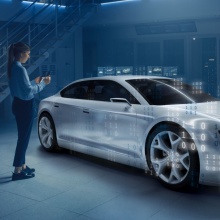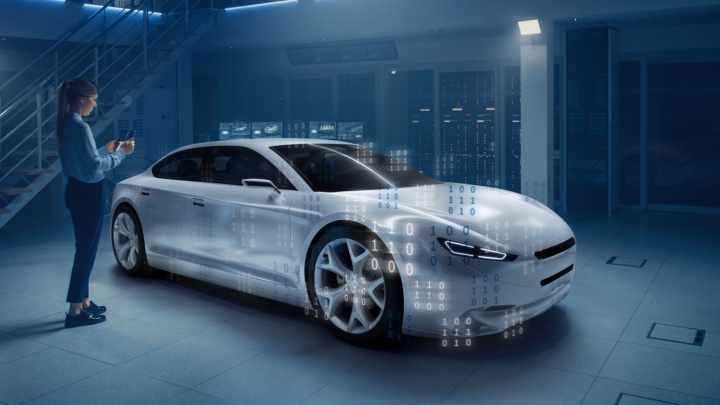In some cases, modern vehicles contain more than 100 control devices. The high degree of complexity of electric and electronic systems and their architecture will continue to increase in the future, but at the same time it needs to remain manageable. Thirteen companies and research institutions, including the University of Stuttgart, the Karlsruhe Institute of Technology (KIT), the Research Institute of Automotive Engineering and Vehicle Engines Stuttgart (FKFS) as well as the FZI Research Center for Information Technology want to create standardized rules and processes together as part of the “Software-Defined Car“ (SofDCar) project to ensure that the electronic components inside the vehicle work together smoothly, can be updated at any time, and as a result stay safe.
The aim of the SofDCar project, which is funded by the German Federal Ministry for Economic Affairs and Energy (BMWi), is for all software updates and upgrades in the future to follow rules and processes through which they can be managed and which are based on the use of a consistent methodology for functional and IT security. This ensures that individual programs do not interfere with one another and that they work without any errors in the system. This is the requirement for ensuring that new functions in and around the vehicle can be developed more quickly in the future and can safely be made available to motorists – throughout the lifespan of a vehicle. The project partners from industry include BooleWorks GmbH, ETAS GmbH, Mercedes-Benz AG, P3 digital services GmbH, T-Systems International GmbH, Vector Informatik GmbH, ZF Friedrichshafen AG, and, as an associated partner, the Baden-Württemberg state agency e-mobil BW GmbH.
The aim of the SofDCar project, which is funded by the German Federal Ministry for Economic Affairs and Energy (BMWi), is for all software updates and upgrades in the future to follow rules and processes through which they can be managed and which are based on the use of a consistent methodology for functional and IT security. This ensures that individual programs do not interfere with one another and that they work without any errors in the system. This is the requirement for ensuring that new functions in and around the vehicle can be developed more quickly in the future and can safely be made available to motorists – throughout the lifespan of a vehicle. The project partners from industry include BooleWorks GmbH, ETAS GmbH, Mercedes-Benz AG, P3 digital services GmbH, T-Systems International GmbH, Vector Informatik GmbH, ZF Friedrichshafen AG, and, as an associated partner, the Baden-Württemberg state agency e-mobil BW GmbH.
“The big SofDCar project is a prime example of how digitalization in vehicle technology can be promoted – working closely together with companies from different industries and partners from science” says Theresia Bauer, Minister for Science, Research and the Arts of Baden-Württemberg. “The Mobility of the Future innovation campus (ICM) at the University of Stuttgart and the KIT provide the ideal collaborative environment for SofDCar with a focus on ‘software-defined mobility’, since here, excellent research, economic implementation and academic training are closely integrated. This close relationship in particular is what we’re striving for with the “Strategy Dialog on the Automotive Industry in Baden-Württemberg”.
Prof. Peter Middendorf, Vice Rector for Knowledge and Technology Transfer at the University of Stuttgart, emphasizes: “The approval of the BMWi Software-Defined Car project is a great success for the University of Stuttgart and the KIT, since on the one hand the initiative came from the joint consortium with the FKFS and FZI as well as of course strong industrial partners from the Mobility of the Future innovation campus, and the thematic focus of the project on the other hand provides an almost ideal connection to the new “software-defined mobility” strategic field of the ICM.
“We want to use innovative ideas to drive forward the transformation process to create environmentally-friendly, networked and automated mobility. By funding SofDCar, we’re taking a major step closer towards this vision”, says Professor Thomas Hirth, Vice President for Innovation and International Affairs at the KIT. “The Mobility of the Future innovation campus offers an outstanding platform for conducting excellent, innovative and interdisciplinary research.”
A new digital twin for the vehicle architecture of the future
Part of the project involves developing an extended digital twin – a virtual image of the vehicle’s development and runtime data. In the future, this twin will encompass the data distributed across the vehicle and in the cloud – from the time a vehicle is manufactured until it is scrapped. This goes far beyond what was previously meant by the term digital twin: for the first time it covers the entire life cycle of a modern vehicle, and it includes the cloud domain, apps, backend systems, and development systems. The project’s plan is for this to ensure a single, unbroken information flow of vehicle data and software versions runs through all databases and servers. This will make it easier and above all quicker to implement software updates and new digital functions and services at any time.
5G test track on the University of Stuttgart campus
On the part of the University of Stuttgart, eight working groups from three departments led by Prof. Michael Weyrich from the Institute of Industrial Automation and Software Engineering are working together on the software-defined automotive future. The development of the “Campus Vahingen” hybrid demonstrator is a significant contribution to this. Thanks to a real-time 5G test track on the campus ringroad, test vehicles and other test setups from all partners can be tested under realistic conditions both on and off the road. Prof. Weyrich stresses: “At the University of Stuttgart we will focus on an IT reference architecture for the vehicles of the future together with the colleagues from Karlsruhe. This involves using software in the so-called edge backend, meaning information hubs outside the vehicles in the future IT infrastructure. Based on the digital twin as well as the real-time 5G campus network, we are able to conceptualize the reference architecture for a continuous and mutual data exchange for new functions in the vehicles of the future.
As part of the Software-Defined Car project, the FKFS is developing networked automobiles to optimize the benefits to the customer. At the Stuttgart Driving Simulator, which is the only one of its kind in Europe, the impacts of online software updates on the driving experience are being researched using test subjects from the general population. Examples of this include new functions to improve the comfort and driving safety of partly and fully-autonomous vehicles. “Research is being carried out into the early recognition and prevention of imminent defects in components in electric vehicles using intelligent functions in the cloud”, says Prof. Hans-Christian Reuss, member of the Management Board at the FKFS and holder of the Chair of Automotive Mechatronics at the University of Stuttgart. “This prevents the vehicle from breaking down in many cases, which has a positive impact on customer satisfaction.”
Safety and reliability of the vehicle software
The scientists at the KIT are looking at innovative development methods and quality assurance approaches for the automotive industry, particularly with a view to IT security. “As well as working closely together with other research partners on IT reference architecture, we also focus on safety and reliability”, says Prof. Ralf Reussner from KASTEL – Institute of Information Security and Dependability at KIT. “For example, we investigate how software functionalities can be updated simply, safely and reliably after buying a vehicle and while taking the various customer-specific vehicle variants into account.” Also, researchers at the KIT want to improve the information management and safety checks, develop data analysis algorithms and data protection analyses, as well as providing identity and access management systems, update methods and hedging strategies.
As well as these aspects, scientists at the FZI Research Center for Information Technology focus on the safeguarding, verification and consistency of vehicle variants. Special attention here is given to recognizing the constraints and weaknesses of the driving function, the evolution of variants and individual functions, as well as managing the versions in use with the help of the digital twin. By identifying and extracting processes and other performance data, it should remain possible to enable quality-controlled application processes beyond the limits of the vehicle. The IT Security Competence Center at the FZI is also investigating additional applied questions related to IT security, such as the safeguarding of vehicle components using artificial intelligence as well as carrying out practical safety tests on selected components.
“Together we’re also testing various aspects related to software-over-the-air at the Test Area Autonomous Driving Baden-Württemberg, and safeguarding and improving its robustness. Our test vehicles are also put through their paces here”, adds Prof. J. Marius Zöllner, Chairman of the FZI as well as Professor at the KIT. “Our aim is to continuously improve the safety of AI-based functionalities by using the valuable possibilities for evaluation made available to us by the test area.”
Expert Contact:
University of Stuttgart: Prof. Michael Weyrich, Institute of Industrial Automation and Software Engineering, Tel.: +49 711 685-67301, E-mail
Karlsruhe Institute of Technology (KIT): Prof. Ralf Reussner, KASTEL – Institute of Information Security and Dependability, Tel.: +49 721 608-44067, E-mail



